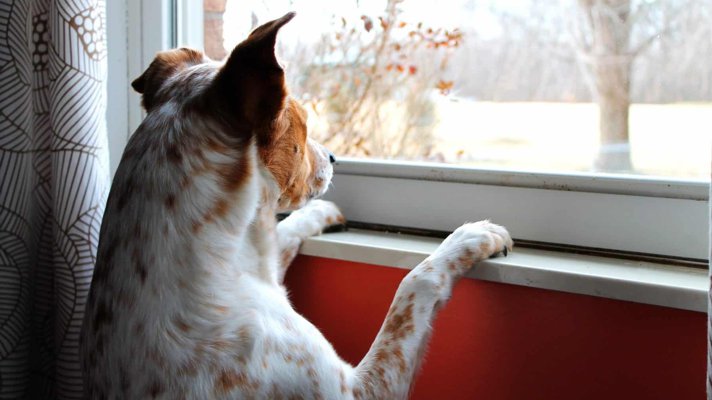By Virginia (Ginny) Merritt
Image: rover.com
One day, many years ago, I was walking in Belleville, Ontario, on a street lined with older houses built on some of the city’s steep hills. Stairs, adorned on either side by rock gardens, allowed residents to mount the abrupt grades from the sidewalks to their homes. On that day, a dog was perched, perfectly still, on the top step as though it were a lion guarding the gates of a mansion, while its owner tended his rock garden. When asked by my companion, “What is your dog doing?”, the man replied, “Practicing his patience.”
Patience, Perseverance, and Acceptance are not simply bestowed upon us from above, like the “quality of mercy” voiced by Portia in her monologue from Shakespeare’s The Merchant of Venice,
The quality of mercy is not strained;
It droppeth as the gentle rain from heaven
Upon the place beneath. It is twice blest;
It blesseth him that gives and him that takes
All three must be learned, practiced, fine-tuned, nurtured, and gently housed within us; inner resources to be drawn upon and to guide us when needed.
Patience, the ability to wait, or to continue doing something despite difficulties, such as provocation, annoyance, misfortune, or pain, without complaint, irritation, or becoming annoyed.
It is no surprise that we in Western societies live in a culture of instant gratification. Almost everything is at our fingertips, every second counts, we become frustrated in traffic, upgrade to faster and faster computers and, when no longer practicing our patience, become less and less patient. Enter the pandemic where we have witnessed the sometimes deadly consequences of impatient individuals and groups, unable to restrain themselves, who ignore public health protocols and directives to gather and socialize in person. Patience is powerful, and its benefits are myriad, Brenda Barron points out in her article, How to Become a More Patient Person (In Both Work & Life).
Perseverance can be seen as tenacity, a persistent, steadfast, and continued effort to do or achieve something, or to overcome challenges in the face of difficulty.
Life has a way of reminding us of the importance of perseverance in our ability to make it through to the end. The current pandemic is no exception. It takes courage and fortitude to persevere. Anna Katarina Shaffner, Ph.D. writes in Perseverance in Psychology: 4 Activities to Improve Perseverance, [Perseverance] “is closely related to a range of other concepts including resilience, motivation, drive, determination, grit, passion, and conscientiousness.” Cultivating perseverance will help us navigate any number of the challenges that come our way, as Helen Hirsh Spence reminds us in The Power of Perseverance and Patience. I have no doubt NASA gave the naming of its Mars Rover a great deal of consideration before it decided upon, Perseverance.
“Acceptance in human psychology is a person’s assent to the reality of a situation, recognizing a process or condition (often a negative or uncomfortable situation (without attempting to change it, protest, or exit”, writes Jefferson M. Fish, Ph.D. in Tolerance, Acceptance, Understanding, Psychology Today.
I think back to a time, many moons ago, when I was sitting in my kitchen having tea with my husband’s 90-year old aunt who was visiting from Scotland. I asked Aunt Nettie, “What is the most important lesson you have learned in your life?”. After a thoughtful pause, she answered, “Tolerance”, and then added, “Acceptance”. In the same article mentioned above (Tolerance, Acceptance, Understanding), Dr. Fish continued, “You can tolerate something without accepting it, but you cannot accept something without tolerating it.” Aunt Nettie was correct. The Serenity Prayer asks the person praying to be granted “the serenity to accept the things I cannot change”. Religiously inclined or not, we can all draw on the acceptance we have nurtured within us, to accept that which we cannot change.
So, how do you get to Carnegie Hall? Practice, practice, practice! The COVID-19 pandemic has presented us with opportunities to practice behaviours that will help us weather pandemics, natural disasters, and everything in between and will, along the way, improve the quality our lives and the lives of others.
In the words of British Columbia’s Provincial Health Officer, epidemiologist Dr. Bonnie Henry, and the title of a new book by Dr. Henry and her sister, Lynn Henry, “Be Safe, Be Calm, Be Kind.”

